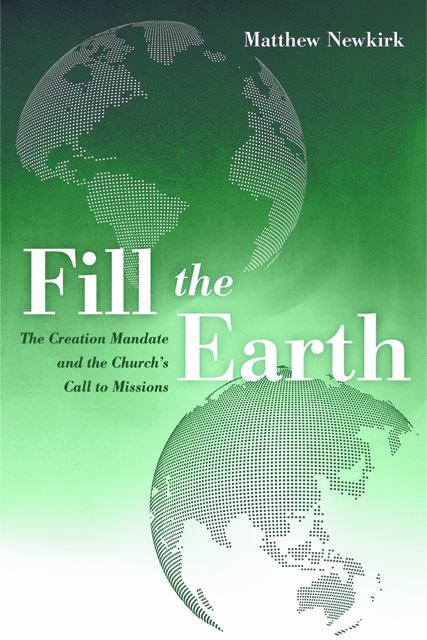Book Review: Fill the Earth


Fill the Earth: The Creation Mandate and the Church’s Call to Missions, Matthew Newkirk. Eugene: Pickwick Publications, 2020. Softcover, 328 pages.
When it comes to what the Bible says about mission, where do your thoughts immediately go? If you’re like most Christians, it’d probably be the Great Commission, especially the version found at the end of Matthew 28. We’re accustomed to thinking almost entirely in terms of Jesus’ command to go and make disciples of all nations. However, the Bible’s teaching about mission reaches far beyond the Great Commission. In fact, as Matthew Newkirk persuasively argues, it stretches back to Genesis and forward to Revelation.
Matt Newkirk has his ordination credentials in the Presbyterian Church in America. He serves in Japan, teaching Old Testament at Christ Bible Seminary in Nagoya. He received his seminary training at Reformed Theological Seminary and also holds a Ph.D. in Old Testament from Wheaton College.
Fill the Earth can aptly be described as an exercise in biblical theology. By “biblical theology,” I don’t mean “orthodox theology” (although it is). “Biblical theology” is a field of study often regarded as having been pioneered by Geerhardus Vos. Vos described biblical theology as “that branch of exegetical theology which deals with the process of the self-revelation of God deposited in the Bible.” God’s revelation is embedded in history and involves a historical progression. Biblical theology describes that, often by taking a topic or concept and tracing its development through the Scriptures. In this case, it’s mission.
There have been previous attempts to wed biblical theology and mission, Greg Beale’s The Temple and the Church’s Mission being one of the most well-known. Newkirk builds on the work of Beale and others. He convincingly demonstrates that not only is mission bound up with the story line of the Bible, but it’s also intrinsic to the church founded in Genesis and which continues through and past the book of Revelation.
One of the notable features of this book is its detailed exegesis of numerous Scripture passages. While he’s tracing out the big picture, Newkirk also has the exegete’s penchant for detail. Some of the detail gets technical, but most readers without advanced theological training should still be able to follow his arguments. Not unexpectedly, the level of detail also means that, at times, other students of Scripture are going to disagree. For example, Newkirk argues that the book of Jonah is only missional “insofar as it exhorts Israel to repent from their hardened and disobedient posture towards God’s Word and respond to him faithfully” (141). I can fully agree that it is missional in that regard, but I find it difficult to ignore the fact that Jonah is sent out by God to a foreign nation with a call to repentance. There appears to be an incipient form of centrifugal mission here pointing ahead to what will unfold in the New Testament. Aside from some of these debatable points of detail, I find Newkirk’s overall trajectory to be cogent, namely that Scripture teaches our mission to be “to fill the earth as God’s representatives and thereby demonstrate that his kingship extends over the entire earth” (18).
Most of Fill the Earth is taken up with making that case. However, Newkirk concludes with a chapter explaining how his argument bears on the work of mission today. Let me share some of the questions addressed (without giving away the answers):
- Is mission merely a reactive response to the presence of sin in the world?
- Is non-expansionistic ministry legitimately classified as “missions”?
- Is missions fundamentally cross-cultural?
- In light of what Scripture teaches, how should we evaluate the trend towards seeing the nations coming to us and therefore concluding that we need not send out missionaries to places without a sufficient indigenous gospel witness?
The cumulative argument made in this book has a bearing on how each of those questions (and more) are answered.
This book is thought-provoking – Newkirk helpfully challenged some of my previously held notions of what the Bible teaches about mission. If you’ve done any reading in the field of missiology, you’ll know how difficult it is to find books which not only take the Bible seriously as the Word of God, but also go in for the deep dive. But to advance the field of missiology in a God-honouring way, that’s exactly what we need, and that’s exactly what Matt Newkirk has provided


